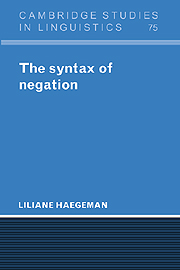
-
Select format
-
- Publisher:
- Cambridge University Press
- Publication date:
- 14 September 2009
- 30 March 1995
- ISBN:
- 9780511519727
- 9780521464925
- 9780521023481
- Dimensions:
- (228 x 152 mm)
- Weight & Pages:
- 0.611kg, 352 Pages
- Dimensions:
- (228 x 152 mm)
- Weight & Pages:
- 0.523kg, 352 Pages
You may already have access via personal or institutional login
Book description
In this book Liliane Haegeman presents an account of sentential negation within a Government and Binding framework. Building on the work of Klima and Lasnik, Haegeman demonstrates the parallelism between negative sentences and interrogative sentences, and gives a unified analysis in terms of a well-formedness condition on syntactic representations: the AFFECT criterion, instantiated as the WH-criterion in interrogative sentences and as the NEG-criterion in negative sentences. It is shown that in the same way that in many languages the WH-criterion gives rise to WH-movement, the NEG-criterion may also give rise to NEG-movement. This is particularly clear in the Germanic languages. In the analysis of sentential negation in Romance languages the author makes extensive use of the notion of representational chain, showing that in these languages too the NEG-criterion applies at the level of S-structure. In addition to providing a syntactic analysis of sentential negation the book also raises a number of theoretical issues such as that of the distinction between A-positions and A'-positions and the level of application of well-formedness conditions. This book will be of interest to all those working on theoretical syntax, particularly of the Germanic and Romance languages.
Contents
Metrics
Altmetric attention score
Full text views
Full text views help Loading metrics...
Loading metrics...
* Views captured on Cambridge Core between #date#. This data will be updated every 24 hours.
Usage data cannot currently be displayed.
Accessibility standard: Unknown
Why this information is here
This section outlines the accessibility features of this content - including support for screen readers, full keyboard navigation and high-contrast display options. This may not be relevant for you.
Accessibility Information
Accessibility compliance for the PDF of this book is currently unknown and may be updated in the future.


